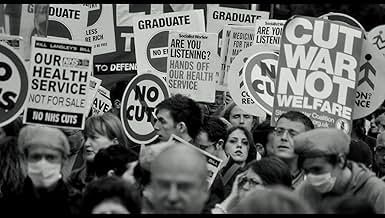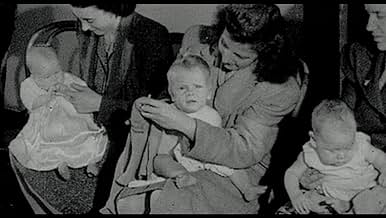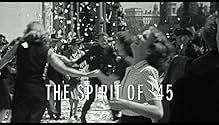The Spirit of '45
- 2013
- 1 घं 34 मि
IMDb रेटिंग
7.1/10
1.4 हज़ार
आपकी रेटिंग
अपनी भाषा में प्लॉट जोड़ेंA documentary on how the spirit of unity, which buoyed Britain during the war years, carried through to create a vision of a fairer, united society.A documentary on how the spirit of unity, which buoyed Britain during the war years, carried through to create a vision of a fairer, united society.A documentary on how the spirit of unity, which buoyed Britain during the war years, carried through to create a vision of a fairer, united society.
- पुरस्कार
- 2 कुल नामांकन
Julian Tudor Hart
- Self - General Practitioner
- (as Dr. Julian Tudor Hart)
Harry Keen
- Self - Consultant Physician
- (as Professor Harry Keen)
Jacky Davis
- Self - Consultant Radiologist
- (as Dr. Jacky Davis)
Jonathon Tomlinson
- Self - General Practitioner
- (as Dr. Jonathon Tomlinson)
फ़ीचर्ड समीक्षाएं
STAR RATING: ***** Saturday Night **** Friday Night *** Friday Morning ** Sunday Night * Monday Morning
Ken Loach has quite a backlog of work as a performance film maker, but his latest work, laying his unashamed socialist leanings firmly on the line, is presented in a documentary format. Loach thrusts us back in time to the immediate post war years, where with a country in ruins and millions sick and injured, there was no shortage of work and so the people had the power, coming together to re-build the country and form one huge powerful united front that let them decide their own fate, all under the thrust of a powerful Labour movement. The real main objective of the movement was not to go back to the appalling poverty of before the war, which nobody noticed and was just accepted by those who lived in it. Flash forward twenty five years or so, to the arrival of Thatcher.
The main trouble, when politics is presented as art, is that you are naturally going to spur on and impress those who agree with you and form the most spiteful critics out of those who think you don't know what you're talking about. Like the most high horsed (but probably best) Michael Moore offering, Ken Loach here bombards us with a presentation of faces, talking heads, if you will, of a mostly much older generation who vividly bring the original socialist movement back to life, and try to paint a portrait of the sort of things that originally spurned it on.
Reminding me of Moore's work a little, as it does, it's all naturally quite one sided and could even be seen as somewhat self indulgent/important, but where Loach gets it right is by managing to make the film's argument so persuasive anyway, genuinely managing to craft a scene where the poor/lower classes generally had no voice and by realizing their combined power, improved things for themselves and their families, only to have it all snatched back from them many years later.
It never feels pretentious in any way. It's just the work of a proud and accomplished director, maybe wearing his heart on his sleeve a little, maybe not being as subtle as he could be, but presenting something made with such insight and, well, spirit you can't help but be impressed anyway. *****
Ken Loach has quite a backlog of work as a performance film maker, but his latest work, laying his unashamed socialist leanings firmly on the line, is presented in a documentary format. Loach thrusts us back in time to the immediate post war years, where with a country in ruins and millions sick and injured, there was no shortage of work and so the people had the power, coming together to re-build the country and form one huge powerful united front that let them decide their own fate, all under the thrust of a powerful Labour movement. The real main objective of the movement was not to go back to the appalling poverty of before the war, which nobody noticed and was just accepted by those who lived in it. Flash forward twenty five years or so, to the arrival of Thatcher.
The main trouble, when politics is presented as art, is that you are naturally going to spur on and impress those who agree with you and form the most spiteful critics out of those who think you don't know what you're talking about. Like the most high horsed (but probably best) Michael Moore offering, Ken Loach here bombards us with a presentation of faces, talking heads, if you will, of a mostly much older generation who vividly bring the original socialist movement back to life, and try to paint a portrait of the sort of things that originally spurned it on.
Reminding me of Moore's work a little, as it does, it's all naturally quite one sided and could even be seen as somewhat self indulgent/important, but where Loach gets it right is by managing to make the film's argument so persuasive anyway, genuinely managing to craft a scene where the poor/lower classes generally had no voice and by realizing their combined power, improved things for themselves and their families, only to have it all snatched back from them many years later.
It never feels pretentious in any way. It's just the work of a proud and accomplished director, maybe wearing his heart on his sleeve a little, maybe not being as subtle as he could be, but presenting something made with such insight and, well, spirit you can't help but be impressed anyway. *****
Why did Churchill lose the elections of 1945. Were people simply ungrateful? According to Ken Loach, there were two main reasons. People remembered the misery after WW1 and they had realized that if the state was able to organize the war victory, it should also be able to win victory in peace.
So it came during Clement Attlee; nationalization of health care, of electricity, of the railways, of the coal mines. And at the same time Britain changed into a welfare state.
It's a very effective documentary, but two questions remain unanswered. How was it all financed and why did Churchill come back in 1951? Anyway, it's refreshing to watch how politics once was in charge.
So it came during Clement Attlee; nationalization of health care, of electricity, of the railways, of the coal mines. And at the same time Britain changed into a welfare state.
It's a very effective documentary, but two questions remain unanswered. How was it all financed and why did Churchill come back in 1951? Anyway, it's refreshing to watch how politics once was in charge.
Might go a little over the top on its conclusions, but it is an important reminder of a spirit of the time portrayed in the documentary.
In a time when Friedman's free market theory dangerously veers towards anarcho-capitalism, it might not be bad to remember that politics and states should still have a say on our society.
Unfortunately, 'The Spirit of '45' might seem a little bit too much like socialist propaganda, in spite of Ken Loach's intentions of trying to stick to the overall zeitgeist of the British society of the time. Deserves recognition, nonetheless, for having the courage of revealing the colour of its flag, in a business where every film is built to be as inocuous and mass-appealing as possible.
In a time when Friedman's free market theory dangerously veers towards anarcho-capitalism, it might not be bad to remember that politics and states should still have a say on our society.
Unfortunately, 'The Spirit of '45' might seem a little bit too much like socialist propaganda, in spite of Ken Loach's intentions of trying to stick to the overall zeitgeist of the British society of the time. Deserves recognition, nonetheless, for having the courage of revealing the colour of its flag, in a business where every film is built to be as inocuous and mass-appealing as possible.
In his varied and multi angled study Ken Loach takes us on a journey back in time laying bare the most fair and socially way of running a country.
Despite the devastation caused by the 6 year World War II, Britain looked back and realised that in the pre-War era although it had the biggest ever empire, the levels of poverty and deprivation were embarrassing.
So, following the end of the War, the country followed ultra socialist policies that improved the quality of life for everyone very dramatically following which the documentary follows the changes in attitudes towards social friendly policies and how they impacted the population indicating how the drive towards ever higher profits is eroding the social fabric of this nation.
A contemplating feast and a nostalgic journey.
Despite the devastation caused by the 6 year World War II, Britain looked back and realised that in the pre-War era although it had the biggest ever empire, the levels of poverty and deprivation were embarrassing.
So, following the end of the War, the country followed ultra socialist policies that improved the quality of life for everyone very dramatically following which the documentary follows the changes in attitudes towards social friendly policies and how they impacted the population indicating how the drive towards ever higher profits is eroding the social fabric of this nation.
A contemplating feast and a nostalgic journey.
THE SPIRIT OF 45 goes back to the end of the Second World War to recreate the unique spirit of that era, when it really did seem as if a new order had been set up in Great Britain, one dedicated to everyone working for each other rather than out to make individual profits. Industries were nationalized with the aim of securing viable investment, the National Health Service offered medical care at point of contact for everyone, while the government of the time dedicated itself for everyone rather than simply appealing to rich interests. With the help of archive film plus testimonies from those who were around the period, Ken Loach evokes a unique spirit, one which has not existed either before or after that period.
Within those terms, the film is a nostalgic piece which makes some important points about people's capacity to change things, if they really want to. But unfortunately Loach veers off his theme when he introduces Margaret Thatcher into the proceedings. It is true that she ushered in a new area of capitalism and selling off state industries to the highest bidder, but we have to remember the size of her victories, which suggest that a substantial slice of the working classes actually voted for her, in spite of the fact that she was working against their interests. What the film illustrates above anything else is the limitation of communal activity, especially when voters are swayed by the prospect of increased wealth through private enterprise - for example, by being given the chance to buy their council houses. It might not be ethically fair, especially for those too poor to accomplish this, but people basically think for themselves first and their fellow-citizens later. In a sense we were responsible for creating a capitalist world; Mrs. Thatcher only offered the conditions.
With this in mind, a lot of the second half of THE SPIRIT OF '45 is largely rubbish, the product of a mind that consciously misreads British history and simply blames the government for all of our problems, rather than ourselves. On the other hand I applaud Loach for advocating this view, for it is only by appreciating its limitations that we can understand that we are responsible for our own demise.
Within those terms, the film is a nostalgic piece which makes some important points about people's capacity to change things, if they really want to. But unfortunately Loach veers off his theme when he introduces Margaret Thatcher into the proceedings. It is true that she ushered in a new area of capitalism and selling off state industries to the highest bidder, but we have to remember the size of her victories, which suggest that a substantial slice of the working classes actually voted for her, in spite of the fact that she was working against their interests. What the film illustrates above anything else is the limitation of communal activity, especially when voters are swayed by the prospect of increased wealth through private enterprise - for example, by being given the chance to buy their council houses. It might not be ethically fair, especially for those too poor to accomplish this, but people basically think for themselves first and their fellow-citizens later. In a sense we were responsible for creating a capitalist world; Mrs. Thatcher only offered the conditions.
With this in mind, a lot of the second half of THE SPIRIT OF '45 is largely rubbish, the product of a mind that consciously misreads British history and simply blames the government for all of our problems, rather than ourselves. On the other hand I applaud Loach for advocating this view, for it is only by appreciating its limitations that we can understand that we are responsible for our own demise.
क्या आपको पता है
- भाव
Self - General Practitioner: It wasn't only "never again" about war. It was "never again" about that kind of peace where everything was run by rich people for rich people.
- कनेक्शनFeatured in Lasciateci fare Vol. 1 (2015)
टॉप पसंद
रेटिंग देने के लिए साइन-इन करें और वैयक्तिकृत सुझावों के लिए वॉचलिस्ट करें
- How long is The Spirit of '45?Alexa द्वारा संचालित
विवरण
- रिलीज़ की तारीख़
- कंट्री ऑफ़ ओरिजिन
- आधिकारिक साइटें
- भाषा
- इस रूप में भी जाना जाता है
- 45 Ruhu
- फ़िल्माने की जगहें
- लिवरपूल, मर्सिसाइड, इंगलैंड, यूनाइटेड किंगडम(archive footage)
- उत्पादन कंपनियां
- IMDbPro पर और कंपनी क्रेडिट देखें
बॉक्स ऑफ़िस
- दुनिया भर में सकल
- $4,88,854
- चलने की अवधि1 घंटा 34 मिनट
- रंग
- ध्वनि मिश्रण
इस पेज में योगदान दें
किसी बदलाव का सुझाव दें या अनुपलब्ध कॉन्टेंट जोड़ें


















